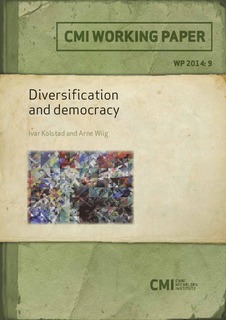| dc.contributor.author | Kolstad, Ivar | |
| dc.contributor.author | Wiig, Arne | |
| dc.date.accessioned | 2018-01-04T08:20:48Z | |
| dc.date.available | 2018-01-04T08:20:48Z | |
| dc.date.issued | 2014-08-01 | |
| dc.identifier | oai:www.cmi.no:5203 | |
| dc.identifier.citation | Bergen: Chr. Michelsen Institute (CMI Working Paper WP 2014:9) 36 p. | |
| dc.identifier.isbn | 82-8062-496-3 | |
| dc.identifier.issn | 0804-3639 | |
| dc.identifier.uri | http://hdl.handle.net/11250/2475142 | |
| dc.description.abstract | Does diversification of an economy improve the chances of democracy? This paper estimates the effect of export diversification on democracy levels, using data from 143 countries. The endogeneity of diversification is addressed by using variability within countries in fertile soil as an instrumental variable, controlling for country size. The results show that diversification has a significant, positive effect on levels of democracy. This suggests that less concentrated economic power in a society leads to more widely distributed political power. The results are robust to alternative measures of diversification and democracy, and to additional covariates. Results are also similar for diversification indices excluding oil, suggesting that the uncovered relationship is not entirely about oil. | |
| dc.language.iso | eng | |
| dc.publisher | Chr. Michelsen Institute | |
| dc.relation | CMI Working Paper | |
| dc.relation | WP 2014:9 | |
| dc.relation.ispartof | CMI Working Paper | |
| dc.relation.ispartofseries | CMI Working Paper WP 2014:9 | |
| dc.relation.uri | https://www.cmi.no/publications/5203-diversification-and-democracy | |
| dc.subject | Diversification | |
| dc.subject | Concentration | |
| dc.subject | Democracy | |
| dc.subject | Political Economy | |
| dc.subject | Angola | |
| dc.title | Diversification and democracy | |
| dc.type | Working paper | |
| dc.identifier.cristin | 1206372 | |
